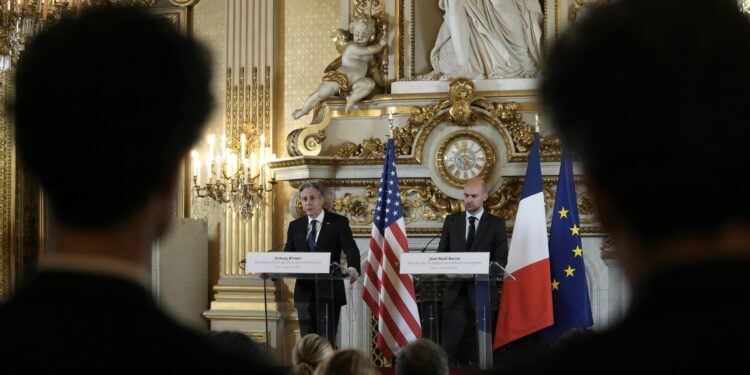PARIS — President-elect Donald Trump has tossed expansionist rhetoric at U.S. allies and potential adversaries with arguments that the frontiers of American power need to be extended into Canada and the Danish territory of Greenland, and southward to include the Panama Canal.
Trump’s suggestions that international borders can be redrawn ﻗ by force if necessary ﻗ are particularly inflammatory in Europe. His words run contrary to the argument European leaders and Ukrainian President Volodymyr Zelenskyy are trying to impress on Russian President Vladimir Putin.
But many European leaders ﻗ who’ve learned to expect the unexpected from Trump and have seen that actions don’t always follow his words ﻗ have been guarded in their response, with some taking a nothing-to-see-here view rather than vigorously defend European Union member Denmark.
Analysts, though, say that even words can damage U.S.-European relations ahead of Trump’s second presidency.
Several officials in Europe ﻗ where governments depend on U.S. trade, energy, investment, technology, and defense cooperation for security ﻗ emphasized their belief that Trump has no intention of marching troops into Greenland.
ﻗI think we can exclude that the United States in the coming years will try to use force to annex territory that interests it,ﻗ Italian Premier Giorgia Meloni said.
German Chancellor Olaf Scholz pushed back ﻗ but carefully, saying ﻗborders must not be moved by force” and not mentioning Trump by name.
This week, as Ukrainian President Zelenskyy pressed Trumpﻗs incoming administration to continue supporting Ukraine, he said: ﻗNo matter whatﻗs going on in the world, everyone wants to feel sure that their country will not just be erased off the map.ﻗ
Since Putin marched troops across Ukrainian borders in 2022, Zelenskyy and allies have been fighting ﻗ at great cost ﻗ to defend the principle that has underpinned the international order since World War II: that powerful nations canﻗt simply gobble up others.
The British and French foreign ministers have said they can’t foresee a U.S. invasion of Greenland. Still, French Foreign Minister Jean-Noﺣ،l Barrot portrayed Trumpﻗs remarks as a wake-up call.
“Do we think weﻗre entering into a period that sees the return of the law of the strongest?” the French minister said. ﻗﻗYes.”
On Friday, the prime minister of Greenland ﻗ a semiautonomous Arctic territory that isnﻗt part of the EU but whose 56,000 residents are EU citizens, as part of Denmark ﻗ said its people donﻗt want to be Americans but that heﻗs open to greater cooperation with the U.S.
ﻗCooperation is about dialogue,” leader Mﺣﭦte B. Egede said.
Danish Prime Minister Mette Frederiksen called the U.S. “our closest allyﻗ and said: ﻗWe have to stand together.ﻗ
European security analysts agreed thereﻗs no real likelihood of Trump using the military against NATO ally Denmark, but nevertheless expressed profound disquiet.
Analysts warned of turbulence ahead for trans-Atlantic ties, international norms and the NATO military alliance ﻗ not least because of the growing row with member Canada over Trump’s repeated suggestions that it become a U.S. state.
ﻗThere is a possibility, of course, that this is just … a new sheriff in town,” said Flemming Splidsboel Hansen, who specializes in foreign policy, Russia and Greenland at the Danish Institute for International Studies. “I take some comfort from the fact that he is now insisting that Canada should be included in the U.S., which suggests that it is just sort of political bravado.
ﻗBut damage has already been done. And I really cannot remember a previous incident like this where an important ally ﻗ in this case the most important ally ﻗ would threaten Denmark or another NATO member state.ﻗ
Hansen said he fears NATO may be falling apart even before Trump’s inauguration.
ﻗI worry about our understanding of a collective West,” he said. “What does this even mean now? What may this mean just, say, one year from now, two years from now, or at least by the end of this second Trump presidency? What will be left?ﻗ
Some diplomats and analysts see a common thread in Trump’s eyeing of Canada, the Panama Canal and Greenland: securing resources and waterways to strengthen the U.S. against potential adversaries.
Paris-based analyst Alix Frangeul-Alves said Trump’s language is ﻗall part of his ﻗMake America Great Againﻗ mode.ﻗ
In Greenland’s soils, she noted, are rare earths critical for advanced and green technologies. China dominates global supplies of the valuable minerals, which the U.S., Europe and other nations view as a security risk.
ﻗAny policy made in Washington is made through the lens of the competition with China,ﻗ said Frangeul-Alves, who focuses on U.S. politics for the German Marshall Fund.
Some observers said Trump’s suggested methods are fraught with peril.
Security analyst Alexander Khara said Trumpﻗs claim that ﻗwe need Greenland for national security purposesﻗ reminded him of Putin’s comments on Crimea when Russia seized the strategic Black Sea peninsula from Ukraine in 2014.
Suggesting that borders might be flexible is ﻗa completely dangerous precedent,ﻗ said Khara, director of the Centre for Defense Strategies in Kyiv.
ﻗWeﻗre in a time of transition from the old system based on norms and principles,ﻗ he said, and ﻗheading to more conflicts, more chaos and more uncertainty.ﻗ
___
AP journalists Jill Lawless in London; Raf Casert in Brussels; Daria Litvinova in Tallinn, Estonia; Geir Moulson and David Keyton in Berlin; and Nicole Winfield in Rome contributed.
Source link : http://www.bing.com/news/apiclick.aspx?ref=FexRss&aid=&tid=678229f15c9f454da3de6a6b1a3c1a53&url=https%3A%2F%2Fabcnews.go.com%2FInternational%2FwireStory%2Ftrumps-words-greenland-borders-ring-alarms-europe-officials-117575353&c=8943464892047528146&mkt=en-us
Author :
Publish date : 2025-01-10 18:23:00
Copyright for syndicated content belongs to the linked Source.












